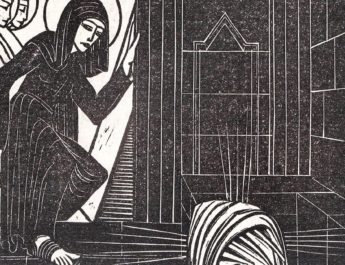Psalm 40:5-10
Annunciation of the Lord ABC
5 You have multiplied,A O LordB my God,C
A “multiplied” = rab + asah. Rab is from rabab (increasing in any aspect whether quantity, authority, size, quality, greatness, etc.). This is abundance, many, elder, exceedingly, great. It refers to abundance of amount, rank, or status. Asah is to make, do, act, appoint, become in many senses.
B “Lord” = YHVH. From havah (to be, become) or hayah (to come to pass, become, be). This is the name of the God of Israel, the self-existent and eternal one, the tetragrammaton. This pronunciation has been lost to time so “Lord” is generally used in its place.
C “God” = Elohim.
your wondrous deedsD and your thoughtsE toward us;
none can compareF with you.
D “wondrous deeds” = pala. From pele (wonder, miracle, wonderful, marvelous thing). This is to be extraordinary, to arise, to be great or accomplish.
E “thoughts” = machashabah. From chashab (literally to weave; figuratively to think or plot something malicious). This is thought, scheme, imagination, purpose, or a plan either good or evil.
F “compare” = arak. This is to arrange by setting in a row. It can also mean to set a battle, estimate, put in order, or compare.
Were I to proclaimG and tellH of them,
they would be moreI than can be counted.J
G “proclaim” = nagad. This is to declare, make conspicuous, stand in front, manifest, predict, explain.
H “tell” = dabar. This is generally to speak, answer, declare, or command. It might mean to arrange and so to speak in a figurative sense as arranging words.
I “be more” = atsam. This is vast, numerous, strong. It can be to close one’s eyes, to make powerful, or to break bones.
J “counted” = saphar. From sepher (writing, document, book, evidence). This is properly to tally or record something. It can be enumerate, recount, number, celebrate, or declare.
6 SacrificeK and offeringL you do not desire,M
but you have given me an openN ear.O
K “sacrifice” = zebach. From zabach (to kill, slay, offer; slaughtering an animal to offer as a sacrifice). This is a slaughter – literally of an animal. So, it implies the act or the animals used in sacrifice. Further, it can mean offering.
L “offering” = minchah. This is a gift or an offering, particularly a sacrificial one that is generally bloodless and given spontaneously (voluntarily).
M “desire” = chaphets. Properly, this means inclined towards or bending to. Figuratively, it means to desire, delight in, or be pleased with.
N “open” = karah. 17x in OT– 8x of digging a pit or trap, 2x of digging a well, 2x of digging a tomb, 2x of bargaining, 1x shriveled, 1x opening an ear, and 1x of digging up evil. This is properly to dig or open up. Figuratively, it can be to plot or make a banquet.
O “ear” = ozen. This is ear, hearing, audience, show. Properly, it is broadness – applied to its ear in reference to its shape.
Burnt offeringP and sin offeringQ
you have not required.R
P “burnt offering” = olah. From alah (to go up, climb, approach, bring; to be high or actively climb; can be literal or figurative). This is a step, stairs, or some kind of ascent. It is also used for whole burnt offerings, being the offering in which the whole things is burned and rises as smoke. Burnt offerings were the least common of the offerings: most were eaten, shared with the priest and the one bringing the offering.
Q “sin offering” = chataah. 8x in OT. From chata (to miss or go wrong and so to sin, bear the blame; it can also include the sense of forfeiting or lacking) OR from chet (sin, fault, or punishment of sin); {from chata (see above)}. This is a sin or sin offering.
R “required” = shaal. This is to ask, inquire, beg, borrow, desire, request. It can also mean to demand.
7 Then I said, “HereS I am;T
in the scrollU of the bookV it is writtenW of me.
S “here” = hinneh. From hen (lo! Behold! If, though; an expression of surprise). This is to draw attention, show suddenness or surprise, or to emphasize the importance of the coming statement. See! Lo! Behold!
T “am” = bo. This is to enter, come in, advance, fulfill, bring offerings, enter to worship, attack. It can also have a sexual connotation.
U “scroll” = megillah. From galal (to roll, roll away, wallow, commit, remove; rolling in a literal or figurative sense). This is scroll or volume.
V “book” = sepher. Related to “counted” in v5. See note J above.
W “written” = kathab. This is to inscribe, write, record, or decree.
8 I delight to doX your will,Y O my God;
your lawZ is withinAA my heart.”BB
X “do” = asah. Same as “multiplied” in v5. See note A above.
Y “will” = ratson. From ratsah (to be pleased with, delight, take pleasure in, or accept with favor; to approve or consent regarding something; can be used specifically of satisfying debts or being pardoned). This is delight shown in favor, good will, something that is accepted or acceptable.
Z “law” = torah. From yarah (to throw, shoot, be stunned; to flow as water so figuratively to instruct or teach). This is law, instruction, teaching, or statute. It can also refer to the first five books of the Bible – the Torah.
AA “within” = tavek. This is among, middle, in the midst, the center. Perhaps, properly, to sever.
BB “heart” = meeh. This is inward parts, belly, heart, womb, intestines, vastness. It can also be figurative for sympathy.
9 I have told the glad newsCC of deliveranceDD
in the greatEE congregation;FF
CC “told the glad news” = basar. This is being a messenger, to publish, carry, or preach. Properly, this is being fresh, rosy or cheerful as one bearing news.
DD “deliverance” = tsedeq. This is rightness, righteousness, vindication. It is everything that is just or ethical. That which is right in a natural, moral, or legal sense. It also includes just weights (i.e. true weights). Figuratively, this is justice, righteousness, equity – even prosperity.
EE “great” = rab. Same as “multiplied” in v5. See note A above.
FF “congregation” = qahal. This is an assembly, congregation, or multitude.
see,GG I have not restrainedHH my lips,II
as you know,JJ O Lord.
GG “see” = hinneh. Same as “here” in v7. See note S above.
HH “restrained” = kala. 18x in OT. This is to stop in the sense of holding back or restraining. It could be keep, refuse, forbid, or to prohibit by word.
II “lips” = saphah. This is lip, edge, border, bank – used for a boundary. It can also be speech or language.
JJ “know” = yada. This is to know, acknowledge, advise, answer, be aware, be acquainted with. Properly, this is to figure something out by seeing. It includes ideas of observation, recognition, and care about something. It can be used causatively for instruction, designation, and punishment.
10 I have not hiddenKK your saving helpLL within my heart,MM
I have spoken of your faithfulnessNN and your salvation;OO
KK “hidden” = kasah. This is to cover, conceal, overwhelm. It is to cover as clothes do or to hide a secret.
LL “saving help” = tsedaqah. Related to “deliverance” in v9. From the same as tsedeq (see note DD above). This is righteousness, justice, righteous acts, and moral virtue.
MM “heart” = leb. May be related to labab (to encourage; properly, to be encased as with fat; used in a good sense, this means to transport someone with love; used in a bad sense, it can mean to dull one’s senses). This is the heart, courage, one’s inner self, the mind, or the will. Heart is only used in a figurative sense in the Old and New Testaments.
NN “faithfulness” = emunah. From aman (to believe, endure, fulfill, confirm, support, be faithful, put one’s trust in, be steadfast. Figuratively, this is to be firm, steadfast, or faithful, trusting, believing, being permanent, morally solid). This word is literally firmness, but figuratively fidelity, faithfulness, honesty, responsibility, trust, truth, steadfastness. This word shares a root with the word “Amen.”
OO “salvation” = teshuah. From yasha (to deliver, defend, help, preserve, rescue; properly, to be open, wide or free, which implies being safe; to free someone). This is deliverance or salvation.
I have not concealedPP your steadfast loveQQ and your faithfulnessRR
from the great congregation.
PP “concealed” = kachad. This is to hide or conceal or destroy. It can also refer to doing secret actions or secret speech.
QQ “steadfast love” = chesed. From chasad (being good, kind, merciful; may mean bowing one’s neck as is done in the presence of an equal for courtesy’s sake; so, if one in a superior position is treating you like an equal, that is what is captured here). This is favor, goodness, kindness, loving kindness, pity, reproach, or a good deed. When done by God to humanity, this is mercy/loving kindness. When done by humanity to God, it is piety.
RR “faithfulness” = emet. Related to “faithfulness” in v10. From aman (see note NN above). This is firmness or stability. Figuratively, it is faithfulness, truth, or trustworthiness. This is the same root that “amen” comes from.
Image credit: “090306d Fore-Warned is Fore-Armed” by Bill McChesney, 2008.




